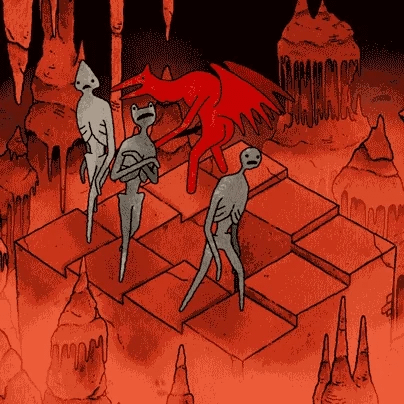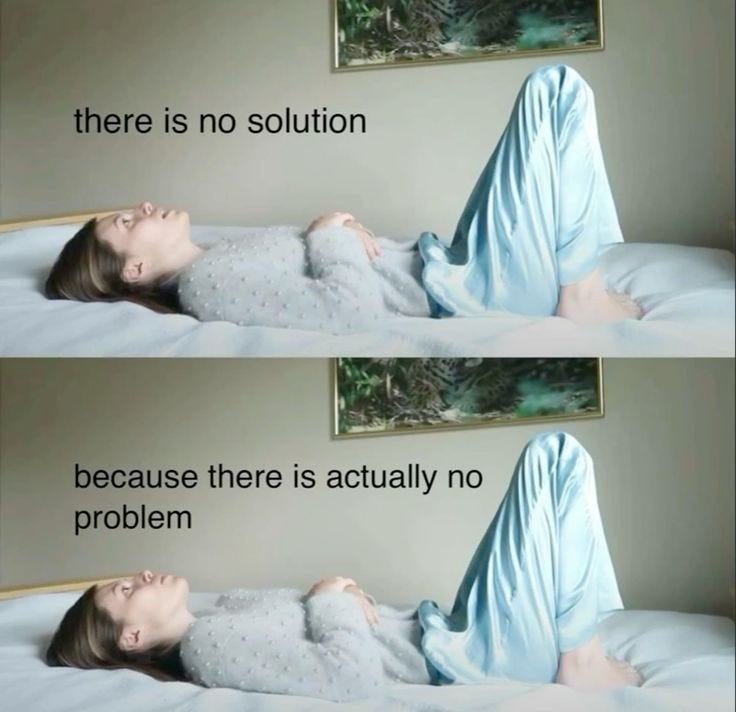why you can't stop licking your emotional hot spots
healing your psychological scars begins with stopping the cycle of reopening old wounds
A friend I met in LA had an old goldendoodle who used to lie in the corner, obsessively licking his paw. Always the same one. The left.
One day, while we were hanging out at her apartment before a night out, I asked her about it.
“Oh, it’s just a hot spot. It’s been there forever,” she said. “I’ve taken him to the vet. We’ve tried everything, but we can’t seem to get rid of it. He won’t leave it alone.”
hot spots
Hot spots are itchy, swollen, infected areas that pop up on a dog’s skin. They usually start with scratching an itch so intensely that it creates an open wound.
From there, the hot spot becomes an obsession. The dog licks and bites at it so much that the hair around it often falls out.
Reopening the wound over and over usually leads to an infection. In trying to find relief, the poor dog only makes things worse. Bacteria is continually reintroduced into the wound, preventing any real healing.
I think people have hot spots too.
Just like my friend’s dog, we often return to painful memories or dysfunctional dynamics, re-experiencing and repeating the same self-abandoning behaviors that keep us from mending our psychological wounds.

if you can’t take the heat…
A while back, someone I love very much shared a piece of advice she’d recently received in a therapy session.
Her therapist had suggested that when she felt particularly dysregulated—frustrated or triggered by someone or something—she should try to "take the heat out of it."
Hearing this struck a profound chord with me.
What exactly was this “heat,” and what was my inability to release it doing to my mental and emotional well-being?
Over the next few days, I became painfully aware of how often I felt the "heat" rise within me. I found myself constantly reading into every response (or lack thereof), letting old hurts and traumas reignite and hijack the present moment. I’d ruminate (for the thousandth time) over what I could do to "fix" the dysfunctional dynamics in my family and hope that the people who raised me might one day truly know and see me.
When I really tuned into that place of pain, it felt exactly like licking an emotional “hot spot”.
But when those psychological wounds feel so real, so deeply infected, the only thing that allows healing is to "take the heat out."
But how?

forgiveness and the “fixer”
If I had a dollar for every time I’ve read (or heard) that the key to true healing is “forgiveness,” “radical acceptance,” or “leaving the past in the past,” let’s just say I’d have a whole lot of fucking dollars.
After consuming admittedly far too much content on psychology, trauma recovery, and spirituality, I’ve realized something: forgiveness is a fundamentally misunderstood concept for most people who are trying to disentangle themselves from the pain of their past.
Here’s what I’ve learned: Forgiveness is about releasing the emotional charge—not about continuing to re-engage in a harmful dynamic.
The key is finding that delicate balance: acknowledging the pain—and the incredibly valuable lessons it brings (even if it takes years to see the benefits of said lessons)—while at the same time freeing ourselves from the emotional power the pain holds over us.
We have to take the heat out. We have to stop licking our psychological hot spots, or they’ll never heal.
And here’s the thing about that heat: it’s actually necessary in the beginning of the healing process. We need to feel it, experience it, let it rise to the surface. But at a certain point, holding onto that heat turns into an infection of the psyche.
Clinging to the pain, re-living the past, or even hoping that people will change—people who’ve shown you time and time again that they won’t—keeps you stuck. Trapped in a perpetual loop of reactivity and hurt.
But what happens when you’re still stuck in relational dynamics where the old pain keeps reactivating? When others refuse to engage in introspection or healing? When the ruptures in the relationship are repeated over and over, without any real repair? When the other party refuses to acknowledge their part in the hurt?
Perhaps you’re like me and you’ve fallen into the trap of taking on the identity of the “fixer.”
This is where the heat keeps getting reignited. You can’t put the fire out on your own, but that doesn’t stop you from pouring every ounce of mental and emotional energy into trying.
It was after a recent fresh betrayal from a family member that I was prompted to take a hard look at myself.
I had to admit: I didn’t deserve a gold medal for being the “fixer.” For being the one always trying to shine a light on the family dysfunction. The one who tried (and failed) to call out the ten thousand skeletons in the closet.
It was time to get real. Nothing was changing.
I had officially become the neurotic goldendoodle, endlessly licking my psychological hot spots. It was a harsh realization—and I hated that this was who I’d become.
the tension of the opposites
Many of us live in a hellscape of two painfully opposing desires: the wish to stay connected to our families, and the knowledge that re-engaging without real change can cause more harm.
Jungian analyst Marion Woodman described this as “holding the tension of the opposites,” a spiritual and psychological practice that involves sitting with two conflicting truths without trying to resolve them too quickly.
Holding the tension of the opposites is about learning to hold both your love for your family and the pain they cause you, without rushing to fix it or escape the discomfort of those conflicting feelings.
This practice is deeply rooted in Jungian thought—the idea that transformation happens when we learn to sit with the tension between opposites long enough for something new to emerge from that tension.
For those of us navigating dysfunctional family systems, the opposites might look like:
The desire to love and stay connected, while needing to protect ourselves from repeated harm or relational “ruptures.”
Accepting family members as they are, while still hoping for change.
Longing for closeness, but also needing firm boundaries.
True psychological and spiritual growth comes from learning to sit with this tension, without feeling the need to immediately resolve it. When we release the compulsion to either “fix” our family systems or disengage from them out of resentment, we tap into immense transformative power.
getting free
True freedom begins when we realize we have the right to make our own choices and follow our own path—without needing to prove anything to anyone.
We often stay enmeshed in family dynamics because of a deep, unconscious need for validation or to prove our parents wrong.
But real independence doesn’t come from seeking their approval or fighting to make them see things our way. It comes from recognizing that we are no longer defined by their expectations, judgments, or reactions.
It’s easy to get stuck in the cycle of trying to make our parents understand how they’ve hurt us, hoping they’ll change or acknowledge their role in our pain. As long as we continue to look to them for validation—whether through confrontation or emotional distance—we stay emotionally tethered to their response (or lack thereof).
The real question is: How do I respond to my parents now? Am I still trying to prove something, or can I let go of that need?
It’s crucial to understand that this isn’t about abandoning compassion. We can still love those who’ve hurt us without repeatedly exposing ourselves to harmful dynamics. We can recognize that, at times, our parents may have done the best they could with the tools they had. Yet, we must also confront the painful truth that, often, they chose to protect their own egos rather than protect us.
So much of our pain comes from the desire to be seen and validated by the very people who brought us into this world. It’s only natural to crave that recognition. But what happens when that moment never comes?
This leads to one of the hardest truths: letting go of the magical thinking that they will somehow change or finally understand us. There’s deep grief in accepting that the connection we’ve always longed for may never be what we imagined.
But the grief is also your gateway to freedom. It allows you to reclaim your power. Instead of being controlled by their capacity—or incapacity—to meet your needs, you learn to fully meet yourself.
From this place, you can finally release the emotional charge of the past.
This is how we take the heat out of the wound.
It’s not about denying our own pain. It’s about recognizing that true healing happens when we stop trying to force others to meet us where we are—and choose to meet ourselves instead.
We begin to truly live knowing we are whole, regardless of whether others ever acknowledge it.
masochistic hopefulness
I’m in the midst of letting go of my own magical thinking when it comes to my family dynamics.
I’ve started calling the state of mind I often find myself trapped in “masochistic hopefulness.” It’s that anxious, clinging belief that someday, things could change—that one day, my parents might wake up, grow, or finally see and love me the way I’ve always deserved. This hope, while beautiful in its way, can quickly become akin to self-sabotage.
Hope turns masochistic when it keeps us stuck in situations that are emotionally damaging.
This kind of hope has had me continually walking back to an empty well—reaching out to people who’ve shown me time and time again who they are, hoping that this time, it’ll be different.
The shadow side of this hope is my refusal to fully let go. I don’t want to believe that my parents will never change, because that would mean abandoning hope altogether.
And if I’m honest, I’m afraid that without my masochistic hope, all I’ll be left with is grief.
The hardest part of this journey is realizing that holding onto hope for someone else’s transformation usually sets us up for more pain—not because we want the pain, but because the alternative, truly letting go, feels like admitting defeat.
And that’s a hard pill to swallow.
But here’s what I’m beginning to understand: letting go is not the same as giving up.
the head f*ck of forgiveness
It’s true that forgiveness is the key to emotional freedom.
But the concept of forgiveness is often misunderstood—especially when it comes to healing from the psychological impact of dysfunctional family systems.
Many people believe that forgiving someone means re-engaging with them in the same way, keeping them in our lives no matter the hurt they’ve caused.
But as I’ve said before—and it bears repeating—forgiveness is about releasing the emotional charge of the past, not staying stuck in harmful dynamics.
So, now what?
Do we just... cut our parents off? Is the only solution to go “no contact”?
Here’s a liberating truth: Forgiveness and boundaries can co-exist. In fact, they must.
Far too often, we feel pressured to “forgive and move on,” but what does that really mean? Moving forward doesn’t mean falling back into the same toxic patterns or allowing repeated ruptures of trust without meaningful change.
Imagine for a moment that a romantic partner treated you the way some of your family members do—continually invalidating your feelings, refusing to change harmful behaviors, repeating cycles of neglect. If you brought this situation to a therapist, or even a trusted friend, would they not encourage you to consider removing yourself from that relationship?
So why should it be any different with family?
Why are we conditioned to believe that blood ties justify ongoing mistreatment, invalidation, or emotional harm?
acts of creation
Many choose to see boundaries in black and white: as if they mean severing ties completely or shutting the door on a relationship forever. But boundaries, much like forgiveness, are often misunderstood and misused.
Boundaries aren’t walls of destruction—they’re acts of creation.
Setting boundaries doesn’t mean you stop loving someone. It means you love yourself enough to protect your peace.
Boundaries aren’t about cutting people off—they’re about creating space for you to grow, to heal, and maybe even for the relationship to evolve over time—but only if the other person is willing to meet you halfway.
Boundaries allow us to take the heat out of the wound.
They create the space we need to stop reopening old hurts, break free from damaging patterns, and let go of the hope for a change that may never come.
Setting boundaries is the recognition that we can’t walk the entire path of healing on our own. We can’t—nor should we be expected to—carry the full weight of a relationship.
It takes two people to change a dynamic. If the other person isn’t willing or capable of engaging in that process, the most loving act we can offer ourselves is to step back.
This is where holding the tension of the opposites comes in again.
You can love your family, forgive them, and accept them as they are—while also protecting yourself. You can understand that they did the best they could with the tools they had without continuing to allow their behavior to hurt you.
Forgiveness and boundaries are not mutually exclusive.

the illusion of “doing they best they could”
The phrase ‘your parents did the best they could with the tools they had’ gets thrown around a lot. I’ve even used it myself in this very piece.
While there’s certainly truth in that statement, ‘doing their best’ doesn’t erase the harm they caused—and it certainly doesn’t mean we’re obligated to keep exposing ourselves to that harm.
At some point, we have to ask:
Why do so many of us believe that our parents’ limitations mean we have to carry the full burden of healing the relationship ourselves?
Just because they ‘did their best’ doesn’t mean we have to carry the burden of healing and introspection on our own. If someone won’t meet you halfway—even if that person is the one who brought you into this world—it’s not your responsibility to do all the emotional work to heal the relationship.
You can forgive your parents, accept their limitations, and still choose to step back to protect yourself.
You can love and understand them without sacrificing your own well-being.
Can you hold the tension of those opposites?
Forgiveness isn’t about forgetting, excusing, or continuing to engage with people who refuse to change. That sounds a lot less like forgiveness and a lot more like self-abandonment.
let it breathe
When it comes to healing the emotional “hot spots” from our past, we have to stop re-opening them—but ignoring them isn’t the solution either. The key is to give them space to breathe.
We can’t heal wounds if we keep fixating on them like a neurotic old dog returning to the same pain, expecting different results. Isn’t that the definition of insanity?
Taking the heat out means stepping away from the obsessive need to fix, re-engage, or prove something to ourselves or others.
This doesn’t mean the wound disappears overnight. It doesn’t mean we forget, or that the pain wasn’t real. What it does mean is that we stop reintroducing the same harmful dynamics that keep us trapped in cycles of hurt. It means releasing the emotional charge.
We take the heat out by recognizing that our healing isn’t dependent on fixing others or waiting for them to change. It depends on our ability to let go of our masochistic hopefulness and focus on our own growth.
When we stop licking our psychological hot spots—when we stop reopening old wounds—we free ourselves.
Taking the heat out of the wound creates space for new ways of being to emerge. It’s about saying, “I love you, I forgive you, but I also choose myself.”
Healing means protecting your peace, stepping back from the fire, and giving your wounds the space to finally heal.
In the end, our power lies in our ability to stop licking the hot spot. It feels good to let the wounds breathe.
And maybe, just maybe, when we stop obsessively tending to old wounds, we’ll open the possibility for others to finally step forward and meet us halfway.
But even if they don’t, we’ve already chosen to take the heat out and walk our own path toward healing.
BOOK RECOMMENDATIONS THAT COMPLEMENT THIS POST:
★ “Owning Your Own Shadow: Understanding the Dark Side of the Psyche” by Robert A. Johnson: This short, powerful book delves into Jungian concepts of the shadow, the parts of ourselves we reject or repress. Johnson explores how confronting and integrating the shadow is essential for psychological and spiritual growth. It mirrors the theme of releasing old wounds and navigating emotional “hot spots” by facing uncomfortable truths about ourselves.
★ “Healing the Shame that Binds You” by John Bradshaw: Bradshaw focuses on the pervasive role of toxic shame in emotional suffering and how it keeps us stuck in cycles of self-abandonment. His approach, rooted in family dynamics and personal empowerment, aligns with our discussion of psychological wounds and the process of healing through setting boundaries.
★ “The Eden Project: In Search of the Magical Other” by James Hollis: Hollis, a Jungian analyst (and previous Back from the Borderline podcast guest), examines our deep, often unconscious longing for the “Magical Other” (a partner, parent, or figure) to heal us. This book resonates with the themes of letting go of the desire for others—particularly family members—to fix our emotional wounds. Hollis highlights the path of individuation and self-reliance in our spiritual and psychological journeys.
★ “A Little Book on the Human Shadow” by Robert Bly: In this concise and accessible book, Bly examines the shadow from a Jungian perspective, touching on how we project our wounds and unresolved emotions onto others. It parallels the idea about re-engaging in dysfunctional dynamics and the emotional charge that comes with it.
★ “Letting Go: The Pathway of Surrender” by David R. Hawkins: Hawkins focuses on the spiritual process of letting go of our attachments to the past, including emotional wounds, trauma, and desires for others to change. His spiritual framework complements the themes of forgiveness, boundaries, and releasing emotional heat that runs throughout our discussion.
EPISODES OF MY PODCAST THAT COMPLEMENT THIS POST:
I’ve handpicked a list of my podcast episodes that dive deeper into the themes we’ve explored here. Browse through and find the one that speaks to what you’re struggling with right now, or take your time and work through them all.
★ childhood emotional neglect part 1: the silent legacy of invisible wounds
★ family scapegoating abuse part 1: the black sheep
★ “why did you even have kids?” (how different generations have transmitted emotional neglect)
★ how a dysfunctional family system functions like a cult
★ when you feel like an alien in your own family: defying dysfunction through healing
★ show me your scars and i’ll show you how deep you are (ft. laurence hillman)
★ are you going to fit in or find your path? (ft. james hollis)
★ reparenting visualization series introduction [free premium offering]
★ living in the shadow of your family tree (interview with family constellations therapist marine sélénée)
★ beyond the mother wound: healing neglect and trauma with the black madonna
★ trauma worlds: when negative experiences meet unique human beings [part 1]
★ shame series part 1: healthy shame makes you human
★ the mother wound: sacred scars as a portal to healing
★ daddy issues: recognizing and healing the father wound
★ healing parental wounds through spiritual practice
★ fear of abandonment and the mother wound in fairy tales
★ when self-help stops helping: recognizing when therapy and introspection might be doing more harm than good
★ were you under-mothered? exploring the generational impact of “mother hunger”
★ from labels to liberation: exploring the power threat meaning framework with dr. lucy johnstone













Thank you. I really need to listen this words.
A similar thing hit me in therapy not too long ago-- the longer it has been since an emotional wound occurred, the lower the odds of ever truly repairing it because the person i need the repair from no longer exists. They are frozen in time, back then. They're not who they were back then either-- they have changed over the years too. And/or they may not even remember the incident that caused the wound.
I wrote a piece on forgiveness awhile back-- came at it from a different angle, but similar conclusion. True forgiveness is an act of self-love, not self-harm or self-sacrifice. In case you want to read it: https://www.jolizbish.com/thoughts/the-gift